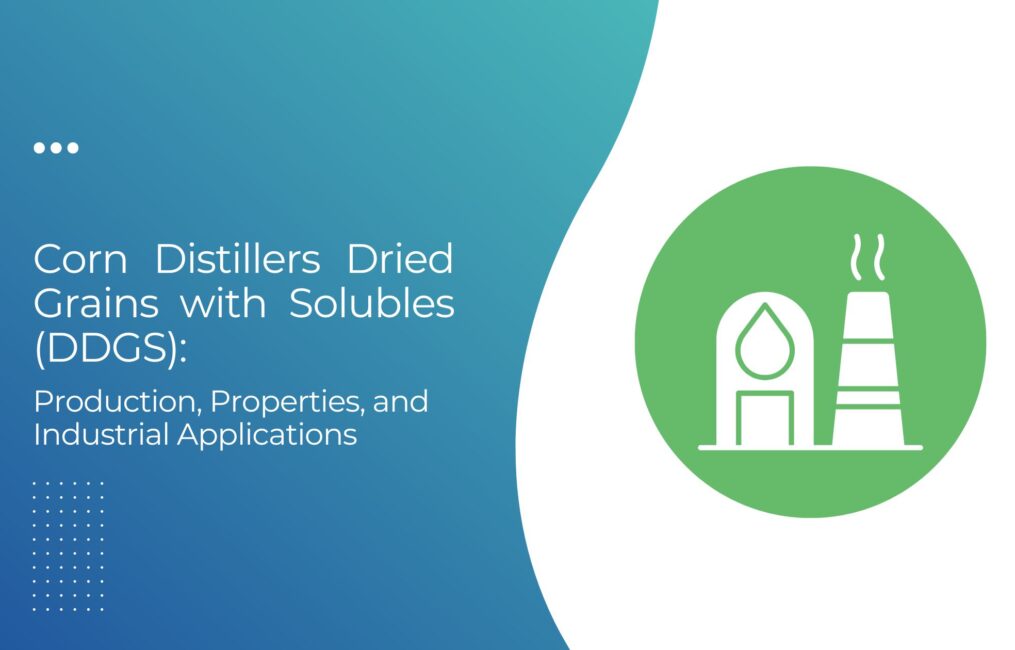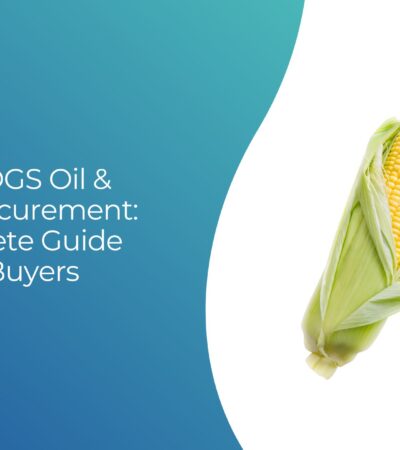Corn Distillers Dried Grains with Solubles (DDGS): Production, Properties, and Industrial Applications

Corn begins as a simple grain. It is planted, harvested, and carried to ethanol plants. There, yeast works quietly, turning starch into alcohol. What remains is not waste. It is distillers dried grains with solubles—corn DDGS. A mix of protein, fiber, vitamins, and oil, it holds the energy and nutrition the starch left behind.
From this residue, DDGS oil is drawn. Sometimes called distillers corn oil, it is rich, dense, and concentrated. The oil alone carries energy for livestock far beyond what carbohydrates can offer. Feed manufacturers prize it. Its value is both practical and quiet—a supplement, a cost saver, a piece of the circular economy.
Today, corn DDGS and DDGS oil are no longer byproducts waiting for use. They are essential resources. Demand grows for reliable DDGS oil sourcing. Farmers, feed producers, and procurement companies seek steady supply, quality assurance, and bulk availability. Each ton shipped tells a story: a grain transformed, energy preserved, life nourished.
The DDGS Production Process
Let’s understand the start of the DDGS production process:
- Corn Preparation
Corn arrives at the ethanol plant. It is cleaned, milled, and hydrated. Every kernel is examined for quality. This step ensures that the DDGS production process begins with uniform, nutrient-rich raw material. - Fermentation
Yeast is added. Starch becomes sugar. Sugar becomes ethanol. The process leaves behind distillers dried grains with solubles (DDGS)—solids dense with protein, fiber, vitamins, and oil. These are the hidden treasures of the ethanol production industry, a byproduct with untapped value. - Separation
The liquid ethanol is drawn off. Solids remain. Proteins and fibers are intact. Fat is retained for extraction. This step turns what was once considered biofuel byproducts into usable feed components. - DDGS Oil Extraction
Before drying, the high-fat fraction is removed. This is distillers corn oil (DDGS oil). It is energy-rich, concentrated, and designed to improve animal feed efficiency. Proper extraction maximizes yield and preserves nutritional value, making DDGS oil sourcing critical for bulk feed manufacturers. - Drying and Stabilization
The remaining solids are dried under controlled conditions. Corn DDGS emerges as a shelf-stable feed ingredient. Proteins, fibers, and residual oil are preserved, ready to enhance livestock nutrition or other industrial applications. - Sustainability Impact
Every step reduces waste. Ethanol byproducts become feed. Nutrients are preserved. DDGS oil and corn DDGS exemplify circular agriculture, turning potential waste into a high-value resource for global feed markets.
Nutritional Composition and Properties of DDGS
DDGS is the residue left after corn turns to ethanol. It is dense with nutrients. Let’s get to know them:
- Protein – The bulk of DDGS is protein. Essential amino acids survive fermentation and drying. They build muscle in livestock. Poultry, cattle, and swine convert it efficiently. Protein is more than nutrition; it drives growth and performance.
- Fiber – Coarse, digestible, unassuming. It moves through the gut, aids digestion, and stabilizes feed. Fiber balances the high energy of DDGS oil. It quietly sustains digestive health and feed efficiency.
- Fats (DDGS Oil) – Fat is concentrated energy. Twice that of carbohydrates. It fuels weight gain, improves feed conversion, and adds density to diets. DDGS oil for animal feed is prized because it delivers energy where it matters most.
- Vitamins – B-complex and trace nutrients remain in the residue. They regulate metabolism, support immunity, and enhance growth subtly. They are present, not flashy, but essential.
- Minerals – Phosphorus, potassium, and others linger. They strengthen bones and aid enzymatic processes. Minerals anchor nutrition, unseen but critical.
- Functional Balance – Proteins, fiber, fats, vitamins, minerals. Each element complements the other. Energy, growth, and health converge in one ingredient. Feed ingredient sourcing of DDGS ensures this balance at scale.
- Economic Edge – Nutrients concentrated, costs lower than alternatives. Feed manufacturers depend on bulk DDGS and DDGS oil sourcing. It reduces waste, keeps livestock productive, and stabilizes supply chains.
DDGS Oil in Animal Feed: Energy, Efficiency, and Economy
DDGS oil delivers high-density nutrition, enhancing livestock performance while keeping feed costs manageable. Its versatility across poultry, cattle, and other livestock makes it a preferred choice for bulk feed formulations and strategic procurement.
- Energy-Dense Nutrition – DDGS oil delivers concentrated fat. Animals burn it efficiently. Growth accelerates. Feed conversion improves. It fuels poultry, cattle, and swine more effectively than bulk carbohydrates. DDGS oil for livestock feed is prized for its energy yield.
- Performance and Growth – Livestock show measurable gains. Poultry gain weight steadily. Cattle increase milk or meat output. Swine grow predictably. The fat in DDGS integrates seamlessly with feed formulations, supporting sustained growth.
- Comparison with Other Fats – Soybean oil or palm oil add fat, but at higher cost. DDGS oil provides similar or higher energy at lower input cost. The choice is strategic. Feed efficiency rises, and producers save without sacrificing nutrition.
- Cost-Efficient Feed – DDGS oil reduces reliance on expensive fats. Bulk feed becomes affordable. Nutrients are concentrated, stable, and consistent. Feed formulations remain predictable. This makes cost-efficient animal feed possible for large operations.
- Versatility Across Livestock – Works in poultry feed, cattle feed, and other livestock diets. Balanced nutrition, high energy, and digestible fat make it a preferred ingredient in mixed rations. DDGS for poultry feed and DDGS for cattle feed are both optimized by its inclusion.
- Supply for Scale – Large feed manufacturers need steady volumes. Reliable DDGS oil suppliers deliver bulk shipments that ensure uninterrupted production. The supply chain supports high-volume operations while maintaining quality.
- Long-Term Value – Beyond immediate energy, DDGS oil stabilizes feed cost over time. Reduces waste. Improves overall farm economics. Producers benefit from both nutrition and financial predictability.
Industrial Applications of DDGS and DDGS Oil
Beyond animal feed, DDGS and its oil serve industrial purposes like biodiesel and fertilizer production. Bulk sourcing and global trade make it a key ingredient for industries seeking sustainable, high-value byproducts.
- Beyond Animal Feed – DDGS and its oil are not just feed. They find roles in biodiesel production, fertilizers, and other industrial processes. Nutrients and fats are repurposed. Ethanol byproducts gain value beyond the farm.
- Global Trade Dynamics – DDGS oil moves across borders. Markets in Asia, Africa, and Europe demand reliable supply. Price, quality, and consistency drive the DDGS oil trade. Large volumes are negotiated, shipped, and tracked.
- Bulk Procurement at Scale – Feed producers and industrial users need steady supply. DDGS oil procurement companies provide verified sources. They manage logistics, contracts, and quality checks. Scale matters. Without it, supply falters.
- Industrial Feed Ingredient Sourcing – Beyond energy, DDGS supports industrial nutrition and ingredient formulations. Proteins, fiber, and fats are leveraged in custom feed blends. This underpins industrial feed ingredient sourcing strategies.
- Growing Global Market – The global DDGS market expands steadily. Rising demand for animal protein and sustainable feed drives bulk orders. Procurement companies act as intermediaries, connecting producers to end users efficiently.
- Sustainability Meets Industry – Using DDGS in industrial applications reduces waste. Biofuel residues become energy, feed, or fertilizer. Efficiency and sustainability converge quietly, without fanfare, but with measurable impact.
Bulk Sourcing and Procurement Insights
Securing DDGS oil in bulk requires verified suppliers, consistent quality, and efficient logistics. Strategic procurement ensures reliable supply for large-scale feed production and cost-effective operations.
- Scale Matters – Businesses often need 300+ tons of DDGS oil. Not a small purchase. Planning, storage, and logistics become critical. Buy DDGS oil in bulk only when supply chains are secure and reliable.
- Supplier Verification – Not all sources are equal. Protein content, fat concentration, and compliance must be verified. Working with verified DDGS oil suppliers reduces risk. Quality consistency cannot be assumed.
- Logistics and Storage – Bulk DDGS oil requires proper handling. Temperature, moisture control, and timely transport matter. Poor storage erodes quality. Procurement planning is as much about movement as it is about purchase.
- Quality Consistency – Animals respond to uniform nutrition. Feed formulations rely on stable energy and protein levels. Bulk sourcing must ensure each shipment meets specifications. DDGS oil procurement is about reliability, not just cost.
- Role of Procurement Companies – DDGS procurement companies like Neshiel Agrochem act as intermediaries. They connect buyers to vetted suppliers, manage contracts, and streamline delivery. Risks are mitigated. Supply is predictable.
- Long-Term Partnerships – Building trust with suppliers pays off. Long-term agreements ensure uninterrupted supply and favorable pricing. Relationships matter as much as the product. Bulk DDGS oil sourcing is a strategic, ongoing process.
Conclusion
DDGS oil transforms what was once ethanol residue into high-value feed. Protein, fiber, and fat converge to fuel livestock efficiently. Cost-effective and nutrient-dense, it supports both growth and profitability.
Corn DDGS and its oil offer more than energy. They enable sustainable feed production. Waste is minimized. Nutrition is maximized. The balance of cost and performance makes DDGS oil procurement a strategic choice.
For feed manufacturers, sourcing from trusted channels matters. Distillers dried grains with solubles require consistent quality. Verified suppliers ensure reliable delivery and steady nutrition for animals.
Looking to secure bulk DDGS oil for your feed operations?
Connect with Neshiel Agrochem, a trusted DDGS oil procurement company. We provide verified supply, streamlined logistics, and end-to-end support. Partner with us for reliable DDGS oil sourcing and optimized industrial feed ingredient sourcing.





